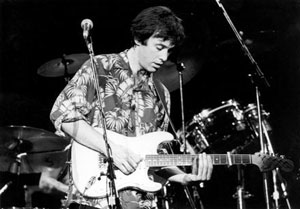This week I've been thinking a lot about the man Rolling Stone ranked number 8 of their '100 Greatest Guitarists of All Time” - Ryland Peter Cooder.
For a start he's the only person I've ever come across called 'Ryland” and, while taking in his new album I, Flathead, I've been marvelling at what must be one of the most extraordinary careers ever forged in the music world.
I grew up with Ry Cooder – I think the first album of his I bought was 1979's Bop Till You Drop which had a hit single, an R&B cover version of Elvis's 'Little Sister”. At the time I knew nothing about him and kinda assumed that he would continue having hits like you expect from cool-looking great guitar players. But that – as far as I'm aware – was the only one. Ry Cooder had a far more eclectic path to follow.
At the time I knew nothing of what he'd already done, but as I collected his previous albums a fuller picture emerged.
Back in the mid-60s Cooder first surfaced, playing in a band with Taj Mahal called The Rising Sons, before attracting attention for his work with Captain Beefheart and his Magic Band and Randy Newman on the songwriter's first two albums. There's three names right there that should put you in the history books.
But Cooder's most famous sixties sessions were with The Rolling Stones. That's him playing mandolin on Let It Bleed's 'Love In Vain” and spooky slide on Sticky Fingers' 'Sister Morphine”. It's hard to listen to Keith Richard's rhythm guitar on the likes of 'Gimme Shelter” without thinking he was heavily influenced by Cooder and things did not end well, with Cooder accusing Keith Richards of stealing his music. For some (possibly legal) reason he has since refused to comment on the acrimonious split.
But all this was before Ry had started his solo career, and when he did he proved to be something of a musical magpie. His self-titled 1971 debut album was a collection of blues but the breakthrough follow-ups, Into The Purple Valley and Boomer's Story, broadened the net to include gospel, calypso and early white country tunes. By the mid-seventies Cooder had fallen under the spell of the Tex-Mex accordion and Paradise and Lunch, Chicken Skin Music and Showtime showcased a unique blend of that and Hawaiian sounds.
After a foray into 1920's jazz (simply called Jazz) I caught up with him on Bop Till You Drop, where he had turned his hand to rhythm and blues. Then, as the eighties dawned, Cooder (after that hit single) turned his back on popular music and moved into the world of film soundtracks.
And what an impact he had! His first soundtrack was for the western The Long Riders, but it was his 1985 music for Paris, Texas, with its haunting slide guitar and musical variations on Bind Willy McTell's 'Dark Was The Night, Cold Was The Ground” that really cut through. Pretty much every time you hear an echoey slide guitar in a film you can trace it back to that point, or the subsequent soundtracks he did for Alamo Bay, Blue City and, particularly Crossroads, a film that mixed the legend of Robert Johnson with the Karate Kid and for which Cooder provided massively influential slide.
Then, after popping up with some phenomenal guitar on John Hiatt's comeback album Bring The Family and briefly joining him, Nick Lowe and Jim Keltner in the supergroup Little Village, Ry Cooder took on the world.
He won a Grammy in 1993 for Meeting By The River, his collaboration with classical Indian musician Vishwa Mohan Bhatt and another for 1994's Talking Timbuktu with Ali Farka Toure. And yet another in 1997 for possibly his most famous partnership The Buena Vista Social Club (after which the American Department of State fined him $US150,000 for breaking the trade embargo with Cuba).
Now his new album I, Flathead is out, his third in so many years. All are concept albums reflecting historical California since the war. The first, Chavez Ravine, focused on the 1950's Chicano community, the second, My Name is Buddy, looked at the labour unions and the new one mines country music and drag racing. They are all really good.
And, even more remarkable, having spent nearly forty years covering other's songs (with only a handful to his own name), Cooder has written all the songs on all three albums, proving himself a gifted lyricist as well as musician. There's even a full book accompanying the duluxe version of I, Flathead, showing that a career as a novelist could be right round the corner.
So there we go. The amazing Mr Cooder. Not bad for a kid called Ryland.



0 comments
Leave a Comment
You must be logged in to make a comment.